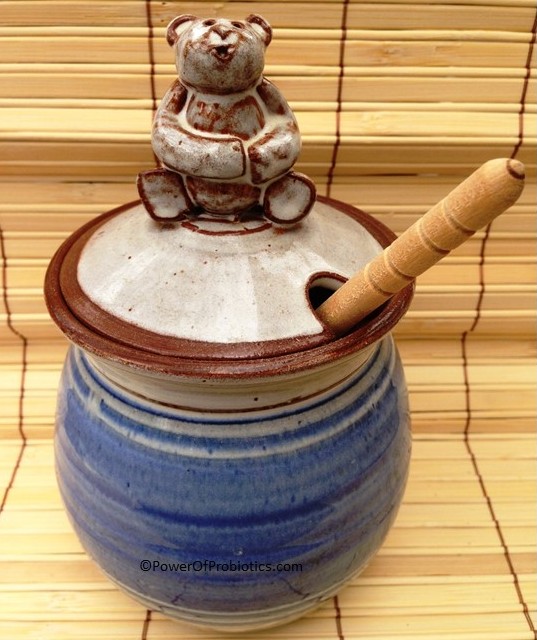Honey Probiotics and Prebiotics
 |
Honey probiotics and prebiotics may be a well-kept secret. Honey, we all know, is a sweetener, but its medicinal use dating back to 2100-200 BC shows that it is more than that. Its composition differs depending on the type, as different parts of the world have different flowers and bees may choose certain flowers over others, even in the same region. |
This sweetener has a high sugar content, low pH, vitamin C and B complex vitamins, bee-derived enzymes, bee-derived peptides and phytochemical compounds such as phenols, flavonoids and carotenoid derivatives. Because of its high sugar content, it should not be used liberally.
This sugary substance also has antioxidant and anti-inflammatory properties and when used topically, forms a protective barrier. Importantly, it has anti-hyaluronidase properties. Hyaluronidase is an enzyme which breaks down hyaluronic acid, a substance which occurs naturally in the body as a major lubricant in eyes and joints, an important component of cartilage, and a major component of skin, to name a few functions. Anti-hyaluronidase activities slow down the breakdown of hyaluronic acid, which explains part of its use in accelerating wound healing, in ulcer treatment, for burns, for bed sores and for infections.
What Medical Uses Does Honey Have?
Various types of this sweetener are being investigated as an alternative treatment for antibiotic-resistant infections. Staphylococcus aureus, Streptococcus pyrogenes, Klebsiella pneumoniae, Escherichia coli, Pseudomonas aeruginosa, Enterococcus faecalis, and C. difficile infections are increasingly difficult to treat. The complexity of this thick, golden liquid, including the honey probiotics, may make it a viable alternative.
It is also being investigated for various cancer treatments, shingles treatment, cough, H. pylori infection eradication, eye disease treatment, diabetes lipid dysregulation, and many other conditions. Honey probiotics are one of the reasons for these investigations.
The most famous, Manuka, is collected by honey bees from a shrub, Leptospermum scoparium, which is indigenous to New Zealand. This specific substance has been shown to have additional antibacterial properties beyond what "normal" honey has that are attributed specifically to a unique Manuka factor (UMF), methylglyoxal (MGO). The levels of MGO vary between batches, so when purchasing Manuka, check its MGO rating. Not all Manuka producers participate in the UMF rating program, so some that are independently tested for total activity are not necessarily inferior to one that was tested with UMF rating. A UMF rating of 0 is low and 20 is high. The efficacy rating is meant to indicate the antibacterial potency compared to a phenol control, such that 5 UMF would imply an antimicrobial potency of 5% phenol.
Manuka is not the only one with documented beneficial properties, however. There are countless research studies validating the use of this golden substance worldwide. In one study epublished in January of this year, it was concluded that a Chilean Ulmo type can potentially inhibit cancer growth at least partly by modulating oxidative stress. This substance is used by indigenous inhabitants to treat infections, and indeed, it showed strong antibacterial activity against Gram-negative pathogens and antibiotic-resistant Staphylococcus aureus. Honey probiotics at work again!
Recently, Saudi Arabian honey samples showed different levels of inhibition in vitro against 5 of 5 pathogens. Also recently, 4 types of US Wisconsin honeys were tested in vitro against 13 pathogens. Three of the types were ineffective at pathogen inhibition but one type, a buckwheat one, inhibited all of the pathogens, and particularly C. difficile strains. These studies further illustrate that the type is important.
Prebiotics
Honey has a prebiotic effect due to its composition, and one study sponsored by the National Honey Board showed that a tempered Grade A type increased the growth rate of a few Bifidobacterium strains.
In a prospective, randomized, controlled trial, medical-grade honey added to milk for pre-term infants showed increased weight gain and improved microbiota composition, with less Enterobacter and more Bifidobacterium and Lactobacillus.
Honey Probiotics
Another extremely important property of this sweetener that is often overlooked is that it contains beneficial bacteria. Although the species in some cases, and strains in other cases, may be different from known human probiotic bacteria, species from the Lactobacillus and Bifidobacterium genera and Bacillus subtilis have been isolated from it. Knowledge of these beneficial bacteria is prompting research into using bee probiotics to improve bee colony health to prevent colony collapse disorders. Bee probiotics may mean better honey probiotics!
Bee honey probiotics are also being investigated for use in human health conditions. One such probiotic, Lactobacillus kunkeei, in a heat-killed form, altered human intestinal microbiota for the better and increased bowel movements in women with constipation and increased secretory IgA in healthy adults.
Caution with Use
Honey probiotics or not, caution must be used with the ingestion of the raw form of this substance in anyone who is
immune-compromised. Never give it to a child under one year of age
unless under the direction of a physician. Honey pacifiers used by infants have caused botulism, a rare but serious illness caused by toxins produced by spore-forming pathogens such as Clostridium botulinum.
Important Note
Here is an important note: without bees, there is no honey and no honey probiotics. Bee populations are declining rapidly, and while several causes are suspected, one that is highly suspect is neonicotinoid pesticides. Neonicotinoids act on insect pests' central nervous system. However, neonicotinoids also may adversely affect beneficial pollinators, such as the honey bee. These chemicals are typically sprayed on seeds of plants before planting, so the entire plant, including the pollen, contains the pesticide. These chemicals may also be applied directly to plants.
In the US, neonicotinoid pesticides (Imidacloprid, Clothianidin, Thiamethoxam, Dinotefuran, and Acetamiprid) are scheduled for review with planned completion in 2018-2019. The European Food Safety Administration implemented restrictions on the use of three neonicotinoids (Clothianidin, Thiamethoxam and Imidacloprid) in 2013, but there has been a loophole for so-called emergency authorization. HealthCanada and other nations’ food safety organizations are also considering bans on at least some of these pesticides.
Bees account for more than 30 percent world-wide of the plants that produce the foods and drinks we consume. In the US, the EPA requires that the label on packaging of plants includes the listing of commercial pesticides that could be harmful to pollinators such as bees.
What Can You Do to Protect Bees?
- Check the labels of plants and seeds you buy and avoid any containing neonicotinoids.
- Talk to your garden center person and express your concern and refusal to buy treated plants.
- Plant a variety of flowering shrubs, trees and plants
- If you are interested in becoming a beekeeper, be sure to do research and take classes so that you know how to take care of bees. Also check with your local government agencies. Beekeeping is prohibited in some areas (like mine, unfortunately.)
- Avoid spraying plants in your garden with insecticides, especially avoiding any flowers. A homemade solution of “white oil” is effective at suffocating pests such as aphids. To make white oil, put 1 part dish soap to 2 parts oil (such as organic canola oil) in a jar, close the lid and shake vigorously. Then add 1 Tablespoon of the mixture to 4 cups of water in a spray bottle and spray leaves of plants. Do not apply during the direct sun exposure.
How to Choose Honey
If you are tempted to buy the cheap options at your grocery store for therapeutic use, this article from the journal Wounds may change your mind. "Table honeys generally possessed lower antibacterial activity than the MGH medical grade honey and contained a wide range of microbial species (pathogens), whereas MGH was sterile." Some of those microbial species were Fusobacterium and Clostridia. The medical grade honey was irradiated so no microbes were detected.
Only buy honey that is raw, unfiltered, and from a supplier that does testing or has independent testing done, even though testing methods are not foolproof. To get the most benefits, a local, raw, unfiltered honey may be your best option. Manuka honey, high in phenols and tested for contaminants, is another good option.
Manuka honey options are available through:
Return to whole foods page.
Return to Homepage.
I research studies and share my clinical experience to write this free site to help you find solutions to your problems. As part of that, I recommend products and services that I genuinely believe will be of help to you. If you click on a link to a product/service, I may receive a small commission to support my efforts if you buy something. The item does not cost you more.
Thanks for visiting this site! If you've enjoyed reading this page or have found the information to be useful to you, please "like", tweet about it, or share it so others can benefit, too. You can leave comments below via Facebook or Disqus.
Comment with Disqus (including as a guest), Twitter or Google accounts:
If you are one of my many readers without a Facebook account, you can still comment.
Disclaimer: Please note: By law, I cannot provide any personalized recommendations for your specific health concern on this site. The information contained in this site is educational in nature and is not intended as diagnosis, treatment, prescription or cure for any physical or mental disease, nor is it intended as a substitute for regular medical care. Consult with your doctor regarding any health or medical concerns you may have.
Subscribe to my occasional newsletter and receive a free copy of "How to Use Probiotics to Lose Weight and Be Healthier".

To comply with the EU's GDPR data privacy regulation, please subscribe here:
Looking for some quality professional supplements, including probiotics? Check out my online dispensary, as I will be doing reviews of some of these products in the future. Click on the Fullscript picture. (Note: If you were a former Wellevate customer, please switch to Fullscript for a better customer experience. Thanks!)
Some competitors of SBI (Solo Build It) are posting fake negative reviews of SBI. If you are considering creating your own website business, or if you have a brick-and-mortar business but want an online presence, I highly recommend SBI!





Comment with Facebook!
I'd love to hear your opinion about what you just read. Leave me a comment in the box below! Other commenting options follow the Facebook comments.